|
|
|
Sort Order |
|
|
|
Items / Page
|
|
|
|
|
|
|
| Srl | Item |
| 1 |
ID:
105195
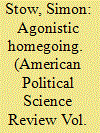

|
|
|
|
|
| Publication |
2010.
|
| Summary/Abstract |
What does the furor over the "politicization" of Coretta Scott King's funeral reveal about contemporary black mourning practices? What does it reveal about black political thought, rhetoric, and practice? Identifying two key modes of mourning and their concomitant conceptions of democracy, this article situates the funeral within a tradition of self-consciously political responses to loss that played a significant role in abolitionism and the struggle for civil rights. Tracing the tradition's origins, and employing the speeches of Frederick Douglass as an exemplar, it considers the approach's democratic value and the consequences of its failure. Arguing that the response to the King funeral indicates that the tradition is in decline, the article locates causes of this decline in significant changes among the black population and in the complex consequences of the tradition's previous successes. It concludes by considering the decline's potentially negative impact, both for African Americans and for the broader political community.
|
|
|
|
|
|
|
|
|
|
|
|
|
|
|
|
| 2 |
ID:
091970
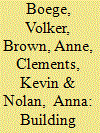

|
|
|
|
|
| Publication |
2009.
|
| Summary/Abstract |
Peacebuilding supports the emergence of stable political community in states and regions struggling with a legacy of violent conflict. This then raises the question of what political community might mean in the state in question. International peacebuilding operations have answered that question in terms of the promotion of conventional state-building along the lines of the Western Organization for Economic Cooperation and Development (OECD) model as the best path out of post-conflict state fragility and towards sustainable development and peace. This article argues for peacebuilding beyond notions of the liberal peace and constructions of the liberal state. Rather than thinking in terms of fragile states, it might be theoretically and practically more fruitful to think in terms of hybrid political orders, drawing on the resilience embedded in the communal life of societies within so-called fragile regions of the global South. This re-conceptualization opens new options for peacebuilding and for state formation as building political community.
|
|
|
|
|
|
|
|
|
|
|
|
|
|
|
|
| 3 |
ID:
121042
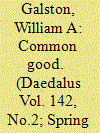

|
|
|
|
|
| Publication |
2013.
|
| Summary/Abstract |
Despite skepticism about the common good, the idea has both theoretical content and practical utility. It rests on important features of human life, such as inherently social goods, social linkages, and joint occupation of various commons. It reflects the outcome for bargaining for mutual advantage, subject to a fairness test. And it is particularized through a community's adherence to certain goods as objects of joint endeavor. In the context of the United States, these goods are set forth in the Preamble to the Constitution - in general language, subject to political contestation, for a people who have agreed to live together in a united political community. While the Preamble states the ends of the union, the body of the Constitution establishes the institutional means for achieving them. So these institutions are part of the common good as well. These are the enduring commonalities - the elements of a shared good - that ceaseless democratic conflict often obscures but that reemerge in times of crisis and civic ritual.
|
|
|
|
|
|
|
|
|
|
|
|
|
|
|
|
| 4 |
ID:
098329
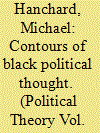

|
|
|
|
|
| Publication |
2010.
|
| Summary/Abstract |
This essay aims to demonstrate how attention to black political thought might expand and complicate our understanding of modern politics and the conceptualization of the political in contemporary political theory, and in modern politics more generally. Black political thought can be viewed as the attempt to develop a set of critical tools to help explain the political distinctiveness of black life-worlds and how this distinctiveness is structured by a series of relations between individual and community, self and other, state and society, citizen and non-citizen, and national and multinational (or global) circumstances. Too often, black politics is exclusively considered as a form of minority group politics and phenomena reducible to empirical investigation and observation, rather than a set of practices with underlying conceptual, theoretical, and epistemological premises. If we understand race as a fundamentally relational concept, namely, an assumption of dynamic interaction between two or more putatively distinct groups, and racism as a political phenomena that is conditioned and articulated through politics, then taken together they provide the opportunity for reflection and consideration of how black peoples and subjects have conceptualized, created and engaged in politics, political communities, and their articulation. Race and racism, the modalities of political participation and, conversely, the modalities of political exclusion have been recurrent themes in black political thought. The distinctiveness of black political thought is symptomatic of the distinctive trajectories of black politics, which first emerged from spaces of exclusion in Western polities and colonies. The histories of black political and social movements provide evidence of the ways in which black subordination in Western societies and polities required the reconfiguration of the actual boundaries between the public and private, the political and the social. Race and racism, the distinction between identity and identification, black solidarities, and the relationship between history, context, and politics and the political are themes central to black political thought.
|
|
|
|
|
|
|
|
|
|
|
|
|
|
|
|
| 5 |
ID:
120507
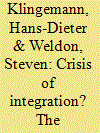

|
|
|
|
|
| Publication |
2013.
|
| Summary/Abstract |
The healthy functioning and long-term viability of the European Union (EU) ultimately depend on its citizens finding common cause and developing a shared sense of political community. However, in recent years, scholars and pundits alike have expressed doubts about whether the EU's growing cultural, religious and economic diversity is undermining the development of citizens' shared sense of political community, especially following eastern expansion. In this article, this question is examined using data on a key aspect of political community: transnational dyadic trust. Drawing on a unique set of opinion surveys from the formative years of the EU to the first wave of eastward expansion (1954-2004), the development and sources of dyadic trust among EU Member States is studied. While recognising the importance of diversity for trust judgments in the short-term, the prevailing viewpoint that it is also a long-term obstacle to integration is challenged. Instead, it is argued that citizens from diverse cultural and economic backgrounds can learn to trust one another and build a sense of political community over time through greater cooperation and interconnectedness. This theory is tested with data on bilateral trade density, which is seen as a proxy and precursor for other forms of cross-national interconnectedness. Employing longitudinal models, the article also goes beyond existing research to test the theories over time. The study makes a contribution to the research on European integration, suggesting that over time mutual trust and a shared sense of political community can indeed develop in diverse settings.
|
|
|
|
|
|
|
|
|
|
|
|
|
|
|
|
| 6 |
ID:
110001
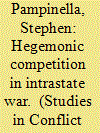

|
|
|
|
|
| Publication |
2012.
|
| Summary/Abstract |
This article employs social constructivist approaches drawn from social movement theory and international relations to explain outcomes of insurgency and counterinsurgency. It argues that mobilizing civilians requires the formation of hegemonic social relations that legitimate coercive force in defense of the political community. Four social mechanisms are hypothesized to be relevant in the creation of hegemony: brokerage, diffusion, reflexive self-restraint, and self-fulfilling prophecies. This constructivist theory of hegemonic competition is then evaluated using a case study of insurgency and counterinsurgency in Iraq's al-Anbar province.
|
|
|
|
|
|
|
|
|
|
|
|
|
|
|
|
| 7 |
ID:
115979
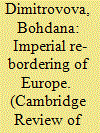

|
|
|
|
|
| Publication |
2012.
|
| Summary/Abstract |
Debates on the European Neighbourhood Policy (ENP) pivot on questions about what kind of political community the EU is becoming and what are the limits of its power projections in the EU's Neighbourhood. Indeed, with this new ambitious and ambiguous policy the EU's external relations are expanding from purely economic to cultural, political and security functions. The EU's desire and need to export its values and norms beyond its borders raises a set of ontological questions about the nature of the EU.
|
|
|
|
|
|
|
|
|
|
|
|
|
|
|
|
| 8 |
ID:
109868
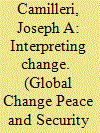

|
|
|
| 9 |
ID:
114995
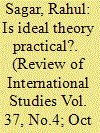

|
|
|
|
|
| Publication |
2011.
|
| Summary/Abstract |
This article examines how the exemplars of ideal theory have addressed what I term 'the problem of preservation'. The 'problem' in question is not so much that a political community must make provisions for its self-preservation, but rather that its provisions must correspond to the intentions and capabilities of its neighbours. This constraint implies that the ability of a political community to pursue ideals rather than power depends heavily on who its neighbours happen to be. This article shows how Aristotle, Rousseau, Kant, and Rawls address this problem by recommending measures such as defensive fortification, collective security, and democratic peace, which, they claim, will dampen the anarchic nature of the international system. It argues that the implausibility of these measures renders the ability of political communities to heed the moral guidance offered by ideal theory contingent at best and impractical at worst. If proponents of ideal theory wish to resist this conclusion, then they must offer a more persuasive answer to the problem of preservation.
|
|
|
|
|
|
|
|
|
|
|
|
|
|
|
|
| 10 |
ID:
117085
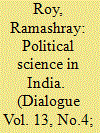

|
|
|
| 11 |
ID:
123528
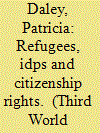

|
|
|
|
|
| Publication |
2013.
|
| Summary/Abstract |
Persistent civil warfare has created a crisis of protection for vulnerable refugees/returnees and internally displaced people ( idps ) in the African Great Lakes region. This is in the context of increasing state hostility towards refugees, intensified inter-group competition among citizens, and rising xenophobia towards African 'foreigners'. Humanitarian solutions are often de-contextualised from struggles over entitlements, citizenship and exclusionary practices based on social hierarchies, ethnicity and indigeneity. Hence, they tend to contribute to rather than alleviate the marginality experienced by the displaced. This article argues for further exploration of the processes of identity construction that accompany displacement and humanitarianism and their problematic relationship with sovereignty and citizenship. It suggests that transcending marginality requires greater emphasis on political agency within refugee and idp communities-for their voices to be part of negotiations and conversations on repatriation and integration-in order for them to rejoin the political community.
|
|
|
|
|
|
|
|
|
|
|
|
|
|
|
|
| 12 |
ID:
114111
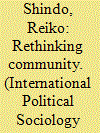

|
|
|
|
|
| Publication |
2012.
|
| Summary/Abstract |
In this paper, I explore one way of thinking about political community. Drawing on Jean-Luc Nancy's idea of community, I suggest that community is not a full circle, but an open-ended line. Thinking community-as-a-line is to shift our focus from the completed pictures of community to the inception of community. In this way of thinking, community is a shared mode of being. I argue that at the heart of sharing lies translation-communication - or translation space - where one (singularity) is perpetually ingrained in others (plurality). The subject constantly "emerges" in relation to others in translation space. I argue that looking at community as a line is a way to avoid the statist boundary, the subject of which is situated either inside or outside. I further argue that the elusive subject in translation space engages in politics through escape.
|
|
|
|
|
|
|
|
|
|
|
|
|
|
|
|
| 13 |
ID:
095886


|
|
|
|
|
| Publication |
2010.
|
| Summary/Abstract |
One paradoxical reality of reform-era China is that the right to the city does not necessarily go to those who have already moved to the city.By employing the perspective of urban accumulation regime and taking Shanghai, the most populous city in the world's most populous country, as a case study, this paper elucidates how urban citizenship can be granted and explores the underlying rationale. The paper argues that the right to the Chinese city, which emphasizes eligibility rather than entitlement, has become part of the broader project of entrepreneurial city building.
|
|
|
|
|
|
|
|
|
|
|
|
|
|
|
|
| 14 |
ID:
145031
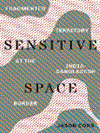

|
|
|
|
|
| Publication |
Seattle, University of Washington Press, 2016.
|
| Description |
xv, 200p.hbk
|
| Standard Number |
9780295995526
|
|
|
|
|
|
|
|
|
|
|
|
Copies: C:1/I:0,R:0,Q:0
Circulation
| Accession# | Call# | Current Location | Status | Policy | Location |
| 058659 | 327.5405492/CON 058659 | Main | On Shelf | General | |
|
|
|
|
| 15 |
ID:
095985
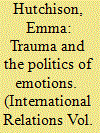

|
|
|
|
|
| Publication |
2010.
|
| Summary/Abstract |
This essay examines how traumatic events can influence the constitution of community in international relations. Trauma is often perceived as isolating individuals and fragmenting communities. This essay argues, in contrast, that practices of representation can make traumatic events meaningful in ways that give them a collective and often international dimension. Central to this process is the role played by emotions. Often neglected in scholarly analysis of international relations, emotions play a crucial political role during times of crisis and can become pivotal sites for the renewal of political stability and social control. The essay illustrates the ensuing dynamics by examining media portrayals of the Bali bombing of 12 October 2002. Focusing on photographs and the stories that accompany them, the essay shows how representations of trauma can provide a sense of collective feeling that is capable of underpinning political community. It concludes by suggesting that international relations scholars can learn much about the politics of community and security by examining prominent representations of trauma and the emotional discourses they mobilise.
|
|
|
|
|
|
|
|
|
|
|
|
|
|
|
|
| 16 |
ID:
120756
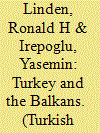

|
|
|
|
|
| Publication |
2013.
|
| Summary/Abstract |
This article analyzes recent Turkish activism in the Balkans from the standpoint of political community. Drawing on but expanding Karl Deutsch's original concept allows us to explore the goals and actions of Turkish policy in the region. Multiple overlapping communities, some embryonic, can be seen to frame Turkish action. These include cultural/ethnic, security, European Union (EU) candidate, EU alternative, business and Islamic communities. Viewing Turkish policies this way offers analytical leverage that highlights the aims and dynamics of Turkish policies as well as possible outcomes of Turkish foreign policy actions in the Balkans.
|
|
|
|
|
|
|
|
|
|
|
|
|
|
|
|
| 17 |
ID:
157726
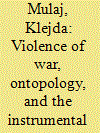

|
|
|
|
|
| Summary/Abstract |
This article considers a neglected question in International Relations, namely how violence of war contributes to the constitution of the political community at the intersection between war and peace. It exposes limitations of means-ends, instrumental understanding of war violence due to the overlooking of violence’s performative attributes stemming from the centrality of bodily injuries in war. The instrumental violence on which the constitution of the political community is grounded finds expression in an order of representation that can be termed ontopology, and a pervasive – circular – relationship between ontopology and violence insofar as ontopology has inspired extreme forms of human behaviour and also been used to justify violence as a means to enact an ontopological goal. Yet, recognising the role of bodily injuries in the course of fighting allows for a more complete understanding of war. Crucially it enables an interpretation of the structure of war as a relation between war’s interior content – casualties in war – and the exterior, verbal issues standing outside it (pertaining to security, identity, sovereignty, authority, ideology), that lead to a surrogate contest of reimagining political community in the process of which performative power of violence contributes directly to the emerging post-war peace and laws that justify it.
|
|
|
|
|
|
|
|
|
|
|
|
|
|
|
|
| 18 |
ID:
130780
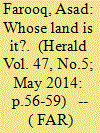

|
|
|
| 19 |
ID:
093742
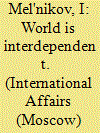

|
|
|
|
|
| Publication |
2009.
|
| Summary/Abstract |
I WOULD LIKE to congratulate the editors, authors and readers of Mezhdunarodnaia zhizn' (International Affairs) with the 55th anniversary of this excellent journal.
Thanks to the indefatigable efforts and professionalism of editors and authors the journal invariably offers profound information about the latest international developments and supplies the readers in Russia and abroad with food for thought about Russia's foreign policies and its place and role on the international scene.
|
|
|
|
|
|
|
|
|
|
|
|
|
|
|
|
|
|
|
|
|